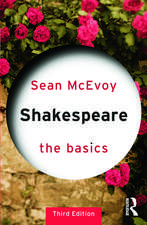Disability, Health, and Happiness in the Shakespearean Body: Routledge Studies in Shakespeare
Editat de Sujata Iyengaren Limba Engleză Paperback – 13 dec 2021
| Toate formatele și edițiile | Preț | Express |
|---|---|---|
| Paperback (1) | 387.20 lei 6-8 săpt. | |
| Taylor & Francis – 13 dec 2021 | 387.20 lei 6-8 săpt. | |
| Hardback (1) | 1111.55 lei 6-8 săpt. | |
| Taylor & Francis – 23 dec 2014 | 1111.55 lei 6-8 săpt. |
Din seria Routledge Studies in Shakespeare
-
 Preț: 311.41 lei
Preț: 311.41 lei -
 Preț: 311.41 lei
Preț: 311.41 lei -
 Preț: 303.82 lei
Preț: 303.82 lei - 9%
 Preț: 934.74 lei
Preț: 934.74 lei -
 Preț: 381.98 lei
Preț: 381.98 lei - 18%
 Preț: 1109.04 lei
Preț: 1109.04 lei - 18%
 Preț: 997.27 lei
Preț: 997.27 lei -
 Preț: 381.98 lei
Preț: 381.98 lei - 28%
 Preț: 820.73 lei
Preț: 820.73 lei - 18%
 Preț: 1109.18 lei
Preț: 1109.18 lei -
 Preț: 256.17 lei
Preț: 256.17 lei - 18%
 Preț: 998.71 lei
Preț: 998.71 lei -
 Preț: 381.00 lei
Preț: 381.00 lei - 31%
 Preț: 762.97 lei
Preț: 762.97 lei -
 Preț: 436.02 lei
Preț: 436.02 lei -
 Preț: 382.75 lei
Preț: 382.75 lei - 31%
 Preț: 766.98 lei
Preț: 766.98 lei -
 Preț: 250.39 lei
Preț: 250.39 lei -
 Preț: 483.49 lei
Preț: 483.49 lei - 18%
 Preț: 1109.18 lei
Preț: 1109.18 lei -
 Preț: 401.24 lei
Preț: 401.24 lei -
 Preț: 389.66 lei
Preț: 389.66 lei -
 Preț: 389.01 lei
Preț: 389.01 lei - 18%
 Preț: 1057.40 lei
Preț: 1057.40 lei - 18%
 Preț: 1106.81 lei
Preț: 1106.81 lei - 30%
 Preț: 848.55 lei
Preț: 848.55 lei -
 Preț: 392.60 lei
Preț: 392.60 lei - 18%
 Preț: 1111.55 lei
Preț: 1111.55 lei - 30%
 Preț: 847.08 lei
Preț: 847.08 lei - 18%
 Preț: 1066.44 lei
Preț: 1066.44 lei - 31%
 Preț: 764.62 lei
Preț: 764.62 lei - 18%
 Preț: 1109.18 lei
Preț: 1109.18 lei - 31%
 Preț: 764.85 lei
Preț: 764.85 lei -
 Preț: 447.51 lei
Preț: 447.51 lei - 18%
 Preț: 1112.21 lei
Preț: 1112.21 lei - 18%
 Preț: 1000.27 lei
Preț: 1000.27 lei - 18%
 Preț: 1000.27 lei
Preț: 1000.27 lei - 30%
 Preț: 846.92 lei
Preț: 846.92 lei - 30%
 Preț: 819.90 lei
Preț: 819.90 lei - 18%
 Preț: 1056.71 lei
Preț: 1056.71 lei - 18%
 Preț: 1110.81 lei
Preț: 1110.81 lei
Preț: 387.20 lei
Nou
Puncte Express: 581
Preț estimativ în valută:
74.10€ • 80.46$ • 62.24£
74.10€ • 80.46$ • 62.24£
Carte tipărită la comandă
Livrare economică 23 aprilie-07 mai
Preluare comenzi: 021 569.72.76
Specificații
ISBN-13: 9781032242712
ISBN-10: 103224271X
Pagini: 292
Dimensiuni: 152 x 229 x 15 mm
Greutate: 0.4 kg
Ediția:1
Editura: Taylor & Francis
Colecția Routledge
Seria Routledge Studies in Shakespeare
Locul publicării:Oxford, United Kingdom
ISBN-10: 103224271X
Pagini: 292
Dimensiuni: 152 x 229 x 15 mm
Greutate: 0.4 kg
Ediția:1
Editura: Taylor & Francis
Colecția Routledge
Seria Routledge Studies in Shakespeare
Locul publicării:Oxford, United Kingdom
Public țintă
Postgraduate and UndergraduateCuprins
1. Introduction: Shakespeare’s "Discourse of Disability" Sujata Iyengar PART I: Nation 2. Teeth Before Eyes: Impairment and Invisibility in Shakespeare’s Richard III Allison P. Hobgood 3. A "Grievous Burden": Richard III and the Legacy of Monstrous Birth Geoffrey A. Johns 4. Obsession/Rationality/Agency: Autistic Shakespeare Sonya Freeman Loftis and Lisa Ulevich 5. Seeing Feelingly: Sight and Service in King Lear Amrita Dhar 6. "Strange virtue": Staging Acts of Cure Katherine Schaap Williams 7. Shakespeare and Civic Health Matt Kozusko PART II: Sex 8. "The King’s Part": James I, The Lake-Ros Affair, and the Play of Purgation Hillary M. Nunn 9. "Gambol Faculties" and "Halting Bravery": Falstaff, Will Kemp, and Impaired Masculinity Catherine E. Doubler 10. Flower Imagery and Botanical Illustration: Health and Sexual Generation in Romeo and Juliet Darlena Ciraulo 11. Shakespeare’s Embodied Ontology of Gender, Air, and Health Sujata Iyengar PART III: Emotion 12. Speaking Medicine: A Paracelsian Parody of the Humors in The Taming of the Shrew Nathanial B. Smith 13. Catching the Plague: Love, Happiness, Health and Disease in Shakespeare Ian Frederick Moulton 14. Breastfeeding, Grief, and the Fluid Economy of Healthy Children in Shakespeare’s Plays Ariane M. Balizet 15. The Worm and the Flesh: Cankered Bodies in Shakespeare’s Sonnets Alanna Skuse 16. Afterword: Ten Times Happier Katharine A. Craik
Notă biografică
Sujata Iyengar, Professor of English at the University of Georgia, earned her Ph.D. from Stanford University. She has written two scholarly monographs, Shades of Difference: Mythologies of Skin Color in Early Modern England (2005) and Shakespeare’s Medical Language (2011 and 2014).
Descriere
This book considers early modern and postmodern ideals of health, vigor, ability, beauty, well-being, and happiness, uncovering the complex negotiations among physical embodiment, emotional response, and communally-sanctioned behavior in Shakespeare's world. It visits the history of the body and how early modern cultures understand physical abil



















